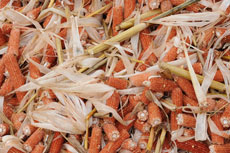Producing a significant amount of ethanol strictly from corn cobs is possible but would require a specific set of circumstances to be economically feasible, according to a new report from Purdue University researchers.
 In the report “The Economics of Harvesting Corn Cobs for Energy,” Matthew Erickson and Wallace Tyner found that factors such as corn yield, farm size, harvesting equipment rental costs and increases in harvest times greatly affected the price per ton, but that government incentives for a possible cob-based advanced biofuel would offset collection costs enough to make it an attractive fuel source. In assessing the economics of cob harvesting the researchers focused on three main factors – the decrease in harvest work rate cob harvesting necessitates, the expense of cob wagon rental and the percentages of cob in residue.
In the report “The Economics of Harvesting Corn Cobs for Energy,” Matthew Erickson and Wallace Tyner found that factors such as corn yield, farm size, harvesting equipment rental costs and increases in harvest times greatly affected the price per ton, but that government incentives for a possible cob-based advanced biofuel would offset collection costs enough to make it an attractive fuel source. In assessing the economics of cob harvesting the researchers focused on three main factors – the decrease in harvest work rate cob harvesting necessitates, the expense of cob wagon rental and the percentages of cob in residue.
The overall conclusion they made is that corn cobs are more expensive to harvest for energy than originally thought, “maybe too expensive to be used for energy production unless the public is willing to further support development.”
Corn growers say it might be worth the price for the nation that wants to continue lessening its dependence on fossil fuels. “As we explore innovative ways to use corn, our most abundant feedstock, to produce renewable energy, we have to remain flexible and dedicated,” said National Corn Growers Association Ethanol Committee Chair Jon Holzfaster. “Currently, our society places an extremely high priority on developing alternative fuel sources. New cob-based biofuel continues our tradition of working towards the goals of the RFS2, keeping our resources at home and developing new jobs in the U.S.”

